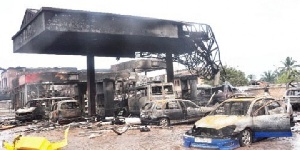 The flood and fire explosion claimed 154 lives, injured 154 others
The flood and fire explosion claimed 154 lives, injured 154 others
Ghana pauses to commemorate the 10th anniversary of the June 3 Twin Disaster, a catastrophic event that shook the nation to its core.
On that fateful night on June 3, 2015, a devastating flood and fire explosion at the Kwame Nkrumah Circle in Accra claimed 154 lives, injured 154 others, and left an indelible mark on the nation’s psyche.
According to a report by citinewsroom.com, it said the events of that night are etched in the memories of Ghanaians.
It added that the torrential rains, the dredging and desilting of the Odaw River’s banks and its tributaries, which are prone to overflowing during rains, the explosion at the GOIL filling station, and the inferno that engulfed the area, are a reminder of the day.
The aftermath was nothing short of grim, with bodies scattered across the streets and emergency responders working tirelessly to clear the devastation.
The total value of property loss was estimated at GH¢1.65 million.
A decade on, the nation still grapples with the trauma of that day.
As a way of mourning, the government of the day in 2015 (under John Dramani Mahama) declared three days of national mourning.
While some remedial efforts have been made, many believe that the deeper structural issues that contributed to the disaster remain unresolved, the report indicated.
Among them are poor urban drainage, unregulated construction, and inadequate waste management that continue to pose risks in the city.
The government-appointed committee on the disaster reported a chain of events that led to the explosion, including the flooding, fuel overflow, and a lit cigarette dropped into the floodwaters.
The final spark, according to the findings, was the act of an individual, Seth Kwesi Ofosu, who reportedly dropped a lit cigarette into the floodwaters laced with fuel.
However, for many, justice and closure remain elusive.
As Ghana marks this solemn occasion, survivors, victims’ families, and civil society groups are calling for accountability and sustained action to prevent such a tragedy from ever happening again.
The June 3 disaster serves as a poignant reminder of the importance of disaster preparedness and urban planning.
As the nation mourns, Ghana has an opportunity to reflect on the lessons learned and to recommit to creating a better future for all its citizens.
The memories of the June 3 disaster will continue to serve as a catalyst for change, pushing the nation to strive for a safer, more resilient tomorrow.
NAD/AE
Watch the latest Twi news on GhanaWeb TV
